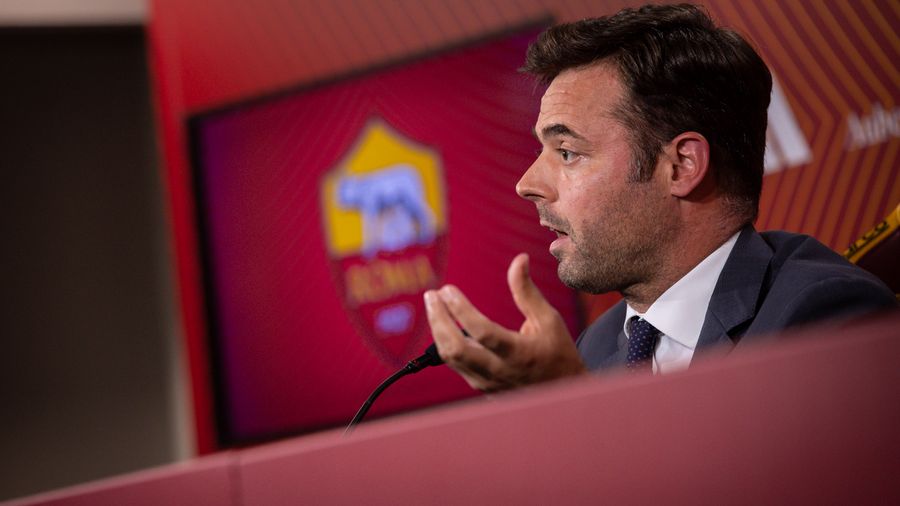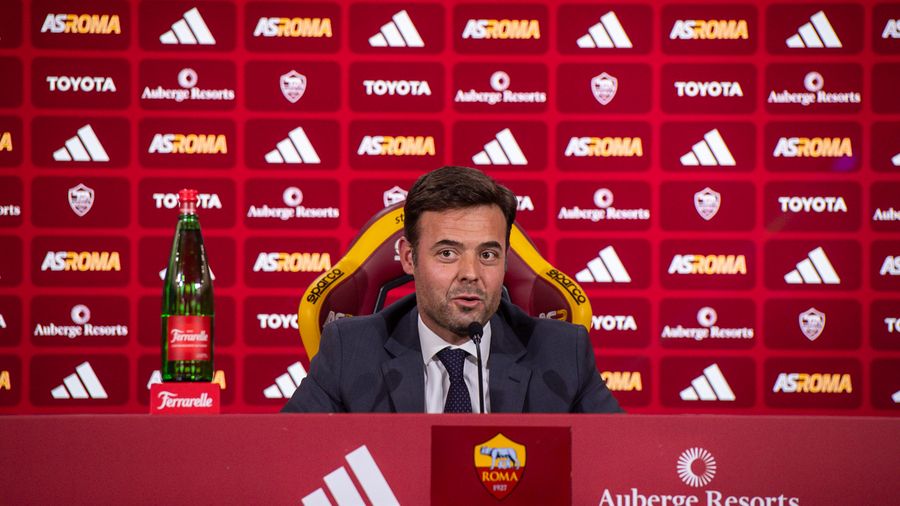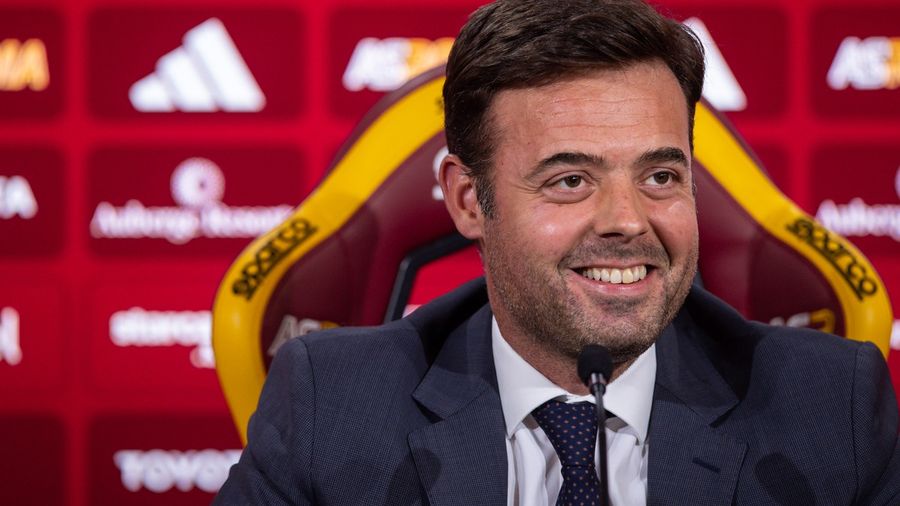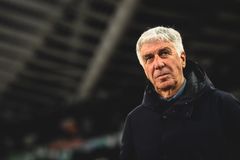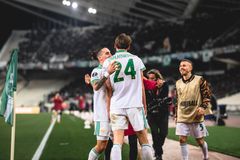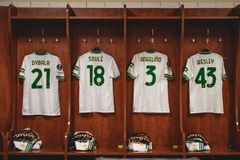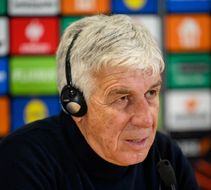

Here is everything Pinto had to say…
It’s always a bit risky going into a season with a coach whose contract is expiring. What do you think and what are the club’s plans with Jose Mourinho?
“I’d like to start by making a small introduction. I didn't want to break my promise: ever since I came to the club I’ve said that I’m not much of a talker but upon the closure of every transfer window I’d be willing and available to clarify all transfer matters.
“I’ve come here today for this, but obviously I’m perfectly aware that there will be questions on matters aside from transfers which we need to tackle. I want you to understand that I’ve been true to my word, and that’s my aim. I’ve said many times that contract renewals are an important subject which the club deals with in the right way: internally, and not in the public eye.
“We’re aware of what we’re going through and all of us at Roma are feeling energised and motivated to get back on track with our goals after the international break. We’re aware of what our strengths are, that we’re capable of getting good results. We can achieve this by focusing on Roma, the team and what we can do better. All of these important matters the club is facing will be dealt with internally, at the right time and by the right people.”
In the last few years Roma have been spending a lot on wages to bring in well-established players who for various reasons might be slightly risky. Will there come a time when Roma start investing in youth again, possibly paying more in transfer fees?
“Thanks for the question – a very valid one. When a transfer window begins, I think we need to put together three different plans. One is on a technical level – perhaps the easiest to understand – and involves the coach, sports management team and owners working together to try to put together a better team than in the previous season. In that sense – and I respect everyone's opinion – if we compare the players who have left with those who have joined, I do believe we have a better team. We have more alternatives and options. That's the technical plan – the easiest to understand.
“Then there's the financial plan. We're in a settlement agreement which means over two years we can spend no more than 70% of the club's revenue on the team. So while other sporting directors may have been off on holiday, I spent the whole of June trying to obtain the financial results that would allow us to stay within this plan.
“Finally, there's the strategic plan, which is what your question is about. For us to get out of the Financial Fair Play situation, it's important to sign young players with bright futures who can help us achieve sporting and financial results. If I'd paid €20 million for [Evan] Ndicka and [Houssem] Aouar, perhaps you would have asked me a different question, because they're both under 25 and have already played hundreds of games in big competitions.
“I understand the question but with the restrictions we have we're trying to strike a balance between the three plans. And I'm sure you realise it's not easy to improve the team while keeping in line with the plan and Financial Fair Play and making sure we have players for the future.
“Don't forget that since Jose Mourinho joined, our youth academy has been a key part of our strategy. From the very first day he's sought to exploit it and has given us the chance to bring academy players through to the first team and give them opportunities. In [Nicola] Zalewski and [Edoardo] Bove, we have two who are first-team regulars, plus another two who train with the seniors on a daily basis. So it's true that our wage bill has increased and if a club brings in five players on loan then it's a valid question, but I think we've managed to align all three plans, as shown by the acquisition of Ndicka and Aouar.”
Ndicka and Aoaur have already achieved something in their careers. I was referring to players like Marcos Leonardo.
“Right. Marcos Leonardo is a target and prospects like him are on our radar but you know how football works and nowadays even players like him have high values. When we have the opportunity to sign them, we do.
“The point I was trying to make with Aouar and Ndicka is that if you go and look at Ndicka's value on Transfermarkt it'll be €25 million or whatever and yet because we signed him on a free, it might seem like someone cast him away as dead wood. That's what I wanted to explain.”
Do you think you've given the coach a team capable of challenging for the Champions League spots? In a recent press conference, Mourinho said that certain players can only be linked with Roma in particular circumstances. Do you see that as a compliment or is it a way of downplaying this type of signing?
“The first thing I'd like to say is that it is impossible for anyone to go away from this press conference with the slightest inkling that there is a any sort of clash between me and Mourinho. That's the first point. So, like in previous occasions, maybe because I don't have that much experience and Claudio [Bisceglie, the club's official interpreter] is a great teacher but my Italian is not perfect yet, I want to be very careful about what I say about the coach because I don't want anyone to get the slightest impression from this press conference that there's a clash between us. We speak the same language and we speak our minds to each other. We're both motivated and determined to carry Roma's plans forward and do what is best for the team. That's the first thing to say.
“As for the Champions League – and, as I said, I don't want to clash with anyone – ever since the day I signed my contract with AS Roma, I understood that the owners' ambition is to be in the Champions League, and it's our aim too. It's my aim. Every day I wake up and come to work and I need an objective – that's mine. Whether or not we achieve it is another matter. And whether we are obliged to achieve it – those aren't words I use. But obviously when I go out and try to sign players like [Gini] Wijnaldum, [Paulo] Dybala, [Romelu] Lukaku and Tammy [Abraham], you have to tell them something. Do you think players of that calibre would join a team that's not challenging for targets like Champions League football? They wouldn't.
“That's the logic from my point of view. And while you can play with words, I don't think the coach and I disagree about things.
“As for the third point, which was touched upon in the previous question, with all due respect to Roma, the fans and the city, we're not Manchester City, are we? Of course I might have wanted to sign Declan Rice but maybe if were City, I wouldn't be sitting here right now – there'd be someone better in my place! Different clubs do different transfer business and we have to understand the reality.
“Another topic is injuries. Besides Dybala, who was a very important player for us last season, we shouldn't forget that since Mourinho joined, with his backroom team and the club's coaching staff, we've managed to get players who had lots of problems into decent physical shape – the likes of [Nicolo] Zaniolo, [Chris] Smalling and Dybala last season. In my view, the work done by our coaching staff, the medical staff and physios, the doctors, and the way they all work together, is a major asset. I can use that to convince players.
“I want to end by making one thing very clear. So that there can be no doubts in future. If anything should go wrong with Renato Sanches, there's only one person responsible and that's Tiago Pinto. I'm obsessed with him. I wanted to have him at Benfica and I couldn't. I wanted to bring him to Roma and I wasn't able to. Now we've done it. Yes, he's had problems in the past, and if he has problems in future, it will be my fault.
“However, I am convinced that with our coach, our coaching and medical staff and everything that Renato might need, we can get the best out of him. That's why we agreed a contract that obliges us to sign him permanently if he plays a certain number of games. If things go well, we'll all be happy. If they don't, we can cut things short and say that I'm responsible, because I'm aware of the risks. But I think he's an amazing footballer and I didn't want to miss the chance to sign him.”
Do you expect the club's policy regarding referees to remain the same this season or are you more willing to take a stance in that sense?
“I think my friends in Portugal might be laughing at this question because I have some previous with referees. We've played three matches and I don't want to wage a war or stir up controversy, but I think we need to hear what referees say, their advice and everything, and I think they need to listen to us too. Personally I've kind of given up because I don't really understand anything anymore. So I don't know how to answer this question. I thought I was someone who watches a lot of football and sees a lot of games so I understood certain things but actually I don't.
“That's why I find it hard to answer you. I can't understand the difference between Zaniolo against Napoli and Rui Patricio against AC Milan. It's not a criticism but I do feel that nowadays there's football that is played and there's VAR football. It seems that referees have less power to make decisions on the pitch. So I think rather than controversy or interviews, the people responsible should listen to the coaches and the players – management figures are perhaps less important. I really have great difficulty expressing an opinion on certain matters because I truly don't understand them – things like having uniform criteria, and the additional time, which we could talk about all season long.
“It's not just in Italy. It happens in Portugal and everywhere. It's a tricky topic but at the end of the day all we want from referees is justice. We all know that in the heat of the moment, when we want to win and we feel we've been hard done by, we might act in a way that people don't like. I must be honest, I'm still young but I struggle to understand where football is going.”
Gianluca Scamacca, Marcos Leonardo, Lucas Beltran, then in the end Lukaku joined. Can you explain the approach here, given that you followed targets of different ages? And can you explain what happened with Beltran and Fiorentina?
“Let me make a joke. I'm 38, divorced, I don't have any children and I'm used to getting 'no' as an answer. So it's not really a big problem. I didn't follow all the names we were linked with closely but you mentioned two players that we entered into talks for and were interested in. We were in talks for Gianluca but we weren't able to sign him for the reasons that are well known.
“Marcos Leonardo is a player we're still interested in. He's a player we've been tracking for 15, 16 months and it reached a point where the deal was not completely done but the three parties were close to agreeing.
“We were unlucky because in the space of a couple of months a historic club like Santos found themselves fighting relegation and their technical coordinator – someone you all know very well [Paulo Roberto Falcao] – was sacked. They changed coach, sold two 17-year-olds for €30 million and the situation became a lot more complicated. Selling your team's best player halfway through the season became a political matter and I had to respect Santos' decision. I was sorry but he remains a target. He's a player I know very well. He's 20 years old and has played 150 games and scored 50 goals for Santos.
“Going a little beyond your question, I think you'll all recognise that it was a difficult transfer window for clubs looking for strikers. We saw that big clubs with huge spending power weren't able to sign strikers or had to spend 100 million in the last few days. It was very difficult.
“I think all Roma fans were happy to see Lukaku join on 28 August rather than some 'Tonino'.
“As for Fiorentina, I'm sorry but I don't know what you're talking about. We know Beltran but I don't know what happened with Fiorentina. There's no problem there.”
Was it really impossible to fix things with Nemanja Matic? How much did you really believe you could get Davide Frattesi in this transfer window?
“You like talking about my failures, don't you? I don't want to say a lot about Nemanja. It's something we're sorry about and I didn't expect it. His last two weeks here was something I really didn't expect. But I'm different to you in this: you always look at the negative side, while I take the positives. Because soon after we managed to get Paredes, a World Cup winner, and we must move forward. I don't want to say much more. I think Mourinho said that Nemanja can explain it one day if he wants to. But I don't want to waste energy on these things. It happens in football. Let's move on. It's not worth talking about anymore.
“Regarding Frattesi, it's true that I've always said he's a player I really like, but at the end of the day we're all free to make our choices. I have no regrets. I care about all these players, and Davide and Gianluca especially, because I may be Portuguese but I feel a little Italian too, and I think they'll be important for the national team. But of course now they're playing for teams that I hope lose. I care about them though. They're great players and I hope things go well for them. At the same time, we made money from those transfers.”
There was a lot of talk about Roma's fee for Frattesi. Is that money useable already?
“Thanks for asking because that's one of the things I need to explain. Perhaps we should have done so before, and that's my fault. Let me take a few minutes to clarify these matters.
“As part of our Financial Fair Play plan, there are two different things. One is the four-year settlement agreement, which means that over two years we can only spend 70% of revenue on the team. We're all on the same page there: the owners, our new CEO Lina [Souloukou], Michael [Wandell, Chief Commercial & Brand Officer], who has to help me with sponsors. All this to achieve that objective. When I was in a rush to find that €30 million by the end of June, I did it to be compliant with the plan, and I think we're in a good place there. And that plan includes sell-on fees.
“Then there's another tool, called transfer balance, which monitors players in the UEFA List A from one year to the next. It's called transfer balance because it measures the balance of players coming in with those leaving. And it's very difficult to make it all fit together. We earned €15 million from sell-on fees: Frattesi, [Riccardo] Calafiori, [Mirko] Antonucci, [Cengiz] Under…”
And Zaniolo.
“No, not Zaniolo because he's joined Aston Villa on loan. We'll get the money only if they buy him. We made nearly €15 million and that money doesn't count towards the transfer balance. We made 17 or 18 million with [Filippo] Missori, [Cristian] Volpato and [Benjamin] Tahirovic, but those kids, even if they were on the bench and Volpato played in the Europa League, weren't on List A – they were on List B. So that €18 million doesn't count towards the transfer balance. That's over €30 million that doesn't count towards the transfer balance.
“I'll give you one more example. I fought with Luis Campos for a week over Paredes because he wanted one figure, I wanted another and we fought for a week. In the end we managed to agree on a €2.5 million fee and €2 million in bonuses. But those €2 million are hard to achieve: he has to start 80% of games for them to get that €2 million bonus. In the transfer balance they count 100% of it: €4.5 million for Paredes.
“I'm not coming here to act like Calimero. I'm not saying it's good or bad because I fully support the principle of Financial Fair Play. I totally agree with the principle of sustainability, which Paolo Assogna always jokes about with me. I agree with the squad limits but this tool makes our job very difficult because we find ourselves in a situation where two of our new players can't be included if we want to be compliant with the transfer balance. I just wanted to shed some light on this technical issue.
“I don't want to criticise, just inform you. It's really very difficult to make the team stronger while trying to maintain the same wage bill – and this year we didn't manage that because when you bring in that sort of player you have to pay – as well as following a strategy. It's very hard to meet all those conditions.”
Out of interest, have you ever compared a photo from when you arrived with a current one? Some people say Rome is a tough city to live in, so what’s your personal experience been? Have Roma thought about the wing-backs and goalkeeper situation?
“I’m tired and I can’t hide it. I understand that it’s your job, but it’s difficult to find yourself under this level of pressure for three months, with this anxiety without eating and sleeping. I’m lucky enough not to be overly affected by external pressure, but when you want to do things well, it’s normal to feel that tiredness. I’m actually off to Portugal after this press conference.
“In terms of the wing-backs and goalkeeper, I think the views expressed by people after the first three games are to be expected. Luckily, we still have another 50 games to play this season. I’m confident in those positions. We have [Leonardo] Spinazzola, Zalewski, [Rasmus] Kristensen, [Rick] Karsdorp, [Zeki] Celik. They are all quality players, who can certainly do better, as we all can. I feel, however, that we can be too quick to judge based on three games in which things didn’t go well, but when it’s not going well collectively, it doesn’t go well individually either. We have room for improvement. We’re all motivated and fired up to do better and I’m sure we will.
“As for the goalkeeper, even more so. When I arrived, the goalkeeping situation at Roma was a real problem. In recent years, Rui was the best goalkeeper in the Conference League. He was near the top in Serie A in terms of clean sheets over the last two seasons. Now that the team hasn’t performed at the level that we are expecting, questions start to be asked. We’re all exposed to that. When we lose, we all lose. When we play badly, we all play badly. When we win and play well, we all win. I have 100% confidence in these players.”
Some goalkeepers have been linked with Roma.
“I don’t know about that. If some goalkeepers’ agents have told you that I called them, it’s a lie.”
You’ve stressed many times that you aren’t worried about your contract expiring next year and that also goes for the coach. Don’t you think it could be dangerous in the players’ heads as they may feel there’s no scope to plan for the future?
“As for renewals, we talk about them in the right setting, which isn’t here. I’m sure that at this point in the season we’re all focused on the same target, which is doing our best during the international break. It’s not simple because we’ve lost almost all of our players, but when we’re all back together, we’ll improve what we need to improve and together, as a united group and family, we’ll get the results that we need.
“I said that about the topic of the coach’s renewal, so just think about how much I’m worrying about my own. That’s the last of my worries.”
What was the most difficult set of negotiations that you’ve had to deal with?
“I’m really a lucky person because in my first summer, I could barely leave my house after [Edin] Dzeko joined Inter, but I was then lucky enough to bring Tammy [Abraham] to Roma and the situation calmed down.
“In the second summer, besides Wijnaldum and Matic, Nobody seemed to want Dybala and I was lucky to bring him to Roma. More or less the same thing has happened now: with the help of everyone at the club, I was lucky enough to sign Lukaku. All the negotiations were different with different people.
“The main thing is always to have the player on our side, on the side of the club, the ownership and the coach, as they’re all important. It’s not a question of money or contracts for these players, but it’s about getting them to feel that Roma is an important club where they can feel important. That’s why it’s hard to say which has been the most difficult negotiation process or which one I’ve liked the most. I’m quite superstitious. I like bringing players in like that in every transfer window. We’ll see about the next ones. I’m very lucky.”
Have you ever been scared about losing Dybala? Have you convinced him of the merits of the Roma project for the coming years?
“I remember how happy I felt about bringing Paulo in ahead of the press conference last year and I was then asked three questions about the clause. I think there was talk about that all of last season in terms of him leaving, the clause, his renewal… We have a great relationship with Paulo and his entourage. We know what his ideas are. Besides being a fabulous player, he’s a professional and a fantastic human being. We communicate honestly and transparently. I invite you all to enjoy having him here. I said I wasn’t worried and we can just enjoy Dybala for the next two seasons, can’t we? We’ll speak about the future at the right time. That also goes for my contract and Mourinho’s too. We’ll see when the time is right.
“How much was written and said about Dybala leaving this summer? I think we need to reflect on why these things get fed. He’s still here in the end. Some may like my style more than others, but I think that over the last two-and-a-half years, I’ve never set unrealistic expectations. I have a great relationship with Dybala and I’m so pleased about everything that we did to bring him to Roma. I think he’s happy here and we’ll do everything we can to keep him.”
When did you realise that the Lukaku operation was feasible? How did you convince Chelsea and the player?
“It’s not in my best interest to say when I realised (Pinto laughs). I have so many defects, but I’m not a liar. I can’t say we were talking about it three months ago because we couldn’t get him in July or June. I have a good relationship with the people who look after him and another player who was mentioned beforehand, a very interesting youngster, so I knew about his situation.
“This is what my job is about. There are situations that were impossible in July. You have to keep monitoring while trying not to speak to anyone in order to create expectations. If the right moment then comes, you have to try to make the most of the opportunity, which is just what happened. Don’t forget that in the Lukaku case, the coach made a key contribution based on the relationship that they had.
“The coach’s contribution is important for every player, but even more so in this case. You also saw the personal involvement of the owners, who made my job much easier. I can say that they got involved in the negotiations and they unlocked the things that needed to be unlocked.
“It’s not in my best interest to say when the negotiations became possible, but just like with other players who were in my head and who I didn’t manage to get, the secret is always the same: you have to monitor the situation and wait for the right time when you need to convince the player within your remit. Then you need to be quick. With Lukaku, we sealed the deal in four or five days. It was five days for Dybala. If you do too much talking, you lose the opportunity.”
There’s a new trend with the Georgian market this year, with players coming to Italy following in the footsteps of [Khvicha] Kvara last year. What do you make of that?
“What I can see is that Kvara is a really good player. I think scouting is more democratic nowadays. There are so many footballers from countries that were unknown years ago and have now become important. Every club is trying to do its best with the fewest resources possible. When Kvara arrived and became one of the best players in Serie A, it was expected that we’d then all go and look at what’s happening in Georgia.
“There are other elements to it too. Their national team’s goalkeeper and forward are very strong, but what’s more interesting in football nowadays is seeing how many Norwegian, Danish and Swedish players there are, while 20 years ago one would come along every now and then. Football has become much more global.”
I won’t ask you what mark you’d give yourself…
“Last season, you gave me a very good mark and then two months later you were criticising me every day. We’ll see the score at the end of the season.”
How pleased are you with the transfer window? Are there any regrets about deals that didn’t materialise? Are the outgoings all done as well?
“I always want to be coherent with what I say. I’ve always said that whether we do well or badly, the market represents 20 or 30% of sporting success in my opinion. Hard work on a daily basis is much more important than what we do. We have to understand that ever since the Friedkins took over the club, they’ve made significant investment. They wanted to develop the club, from the training ground to the stadium project. The team has to be a reflection of that strategy, ambition and motivation.
“More than words and interviews, we need to play and focus on the facts. Within my job in the three areas that I explained, I always try to do my best for the team and ensure we can have a better season than the previous one. If you ask me if I’m happy, I’ll say that I’ve suffered so much. I’ve worked so hard. In the end, we’re never satisfied. Something I’ve learnt from my former president is that every time I close a deal, I think I could’ve done better. If I sell for €30 million, I wonder if I could’ve sold for €31 million. If I buy for €5 million, I ask myself if I could’ve bought for €4 million. Maybe there was scope to do that. I don’t use the word ‘happy’ very often. I think we’ve done a good job as a team with so many people here: with Maurizio (Lombardo, ndr), Daniele (Placido, ndr), Gianluca (Gombar, ndr), with the press office, Lina (Souloukou, ndr), Anna Maria (Rabuano, ndr), Roberto (Fonzo, ndr), who have helped me do justice to the ownership’s vision and ambitions over the last three months.”
Did you think Atalanta acted improperly regarding [Duvan] Zapata?
“I have my faults too. I’m a bit stubborn. When we’re in the market carrying out negotiations, I have my strengths and weaknesses. I have something that maybe isn’t widely appreciated in Italy: I have a very German approach. I’m more German than Latin. If I say something, that’s it and case closed. While others may be more used to haggling, I have a different approach.
“I’ll never speak about any sort of improper conduct. Atalanta and their coach [Gian Piero] Gasperini made the decisions that they needed to make. I can’t hide the fact that we had spoken to Duvan and he was a player that we wanted. In the end, it didn’t work out, but we did find other solutions straight away. I’ll never talk about acting improperly even if there are clubs that have done that in my experience. The best thing is to ignore anything like that.”
But did Zapata confirm that he wanted to come to Roma?
“I’ll repeat that we were in talks with Zapata. There were negotiations, but it didn’t come to fruition in the end. I don’t mean we didn’t manage to sign him because Atalanta acted improperly. I’ll never say that. It’s part of the job. You win some, you lose some. Sometimes you manage to see something through, other times there’s someone else smarter than you. That’s how it is.”
Could you tell us what’s happening at the moment given that nobody spoke after Roma against AC Milan?
“I’ll repeat what I said before: when we lose, we all lose. When we win, we all win. None of us are pleased about this situation, but there’s no reason to be panic-stricken. We’re talking about three games. The three matches were played in a difficult setting in terms of the transfer window being open. There is so much confusion and there are so many problems.
“We’re not happy, but we’re aware of what we can do. We know we’re all capable of better. I’m fully motivated and fired up to calm people down over the fact that after the international break, we’ll have everything in place to improve. Having compared with the window, every now and then a bit of balance is missing. I know it’s difficult to ask for that here at Roma.
“On the day when we signed [Sardar] Azmoun, I received hundreds of messages on Instagram asking me to leave and people saying I was rubbish. After we got Lukaku, I was told that I was the king of Rome. In reality, I’m neither one nor the other. I’m just a normal guy doing my job.
“As for results, it’s more or less the same. Obviously, it’s a bit frustrating if things aren’t going well, but there are 35 league games left. The players have quality. The coach has quality and is a leader, as you know. We know we’re on a dip in form, but we’re fired up to turn this problem into a positive situation. Stay calm!”

 Tickets
Tickets
 Shop
Shop













